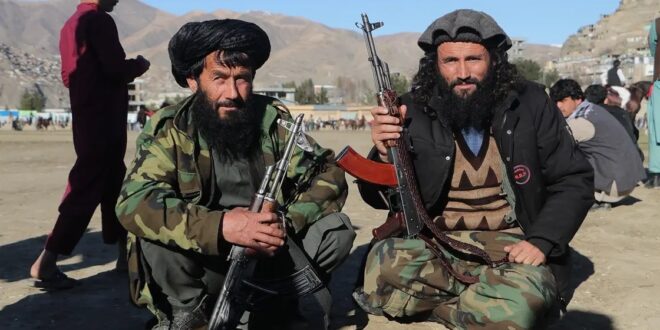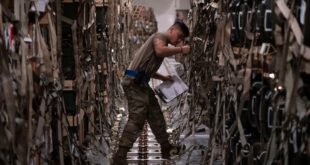In mid-May, Iranian President Ebrahim Raisi issued a warning to the Taliban: honor Afghanistan’s water-supply agreement or face the consequences.
A well-known Taliban figure offered a mocking gift of a 20-liter water container in response and told him to stop making terrifying ultimatums. About a week later, a skirmish erupted on the border, leaving two Iranian guards and one Taliban member dead.
For all the latest headlines follow our Google News channel online or via the app.
The Taliban sent thousands of troops and hundreds of suicide bombers to the area, according to a person familiar with the matter, who says the group is prepared for war.
After two decades fighting the US, Taliban leaders now find themselves sparring with neighbors as the realities of global warming hit home. The dispute with Iran over depleted water resources is further destabilizing an already volatile region.
“The water shortages in the Helmand River basin are a result of climate change as the country heats up and suffers huge excesses of rainfall followed by terrible dry spells,” said Graeme Smith, a senior consultant on Afghanistan at the International Crisis Group, a non-profit organization. “Temperatures in the country are up 1.8C since 1950.”
Iran signed an agreement in 1973 for Afghanistan to supply a stipulated amount of water a year in “normal” climate conditions from the Helmand, a more than 1,000 kilometer (620 mile) waterway that runs from the Afghan Hindu Kush mountains through the country and into Iran.
The water from Afghanistan’s longest river is critical for agriculture and consumed by millions of people on both sides of the border.
Iran argues the Taliban reduced the water supply since it returned to power and isn’t keeping Afghanistan’s side of the bargain.
Iranian foreign ministry spokesman Nasser Kanani said in a press conference last week that “preliminary agreements are in place with the Taliban government over Iran’s rights to water from the Helmand,” without providing further details.
“Take my words seriously,” Raisi, Iran’s president since 2021, said during a visit to Sistan-Baluchistan, the country’s poorest province, which was hit hard by the water shortage. “I warn the officials and rulers of Afghanistan that they should honor the water rights of the people of Sistan.”
Taliban spokesmen Zabihullah Mujahid and Bilal Karimi didn’t respond to calls and messages seeking comment.
Mujahid said in May Raisi’s comments were inappropriate and could harm ties. Foreign Minister Amir Khan Muttaqi contends the issue only occurred because of drought, and Afghanistan respects the agreement.
The pact itself leaves room for interpretation. The water supply must be “adjusted in times of drought,” it says, and both countries must engage in “diplomatic negotiations” to resolve any issues.
But despite the call for diplomacy, the Taliban prepared for war. As well as soldiers and suicide bombers, its rare military deployment also included hundreds of military vehicles and weapons left behind by the US, the person said, asking not to be identified due to the sensitivity of the situation.
“Both sides can make a case to justify their positions,” said Omar Samad, a senior fellow at Washington-based think-tank the Atlantic Council and former Afghan envoy to Canada and France. He pointed to Afghanistan’s “protracted state” of crisis and Iran’s need for water at a time of drought.
If neither wants to resolve the issue through diplomatic channels, it will be “politically irrational and lead to regional destabilization at a time when neither side can afford conflict,” he said.
The agreement has been a source of tension for decades. Iran has long argued it doesn’t receive enough water. The situation worsened with the Taliban’s takeover, which came during years of drought.
And while it’s hard to analyze both sides’ claims as no water supply data is available, Fatemeh Aman, a non-resident senior fellow at Washington-based think-tank the Middle East Institute, says Iran has only itself to blame.
“The Iranian authorities had over 40 years to invest in water management or prepare the region for disaster,” she said. “They failed.”
Iranian lawmakers said in June the situation in Sistan-Baluchistan is so dire that a “humanitarian disaster will occur if people don’t get access to water,” according to local media. More than 10,000 families fled the province’s capital in the last year, according to a report.
At least 300 towns and cities in Iran face acute water stress as the planet gets hotter. Dams are evaporating, and more than 97 percent of the country is affected by drought, according to one estimate. Some 20 million people moved to cities because the land is too dry for farming, according to one academic.
Some of the roughly 3 million Afghans who escaped to Iran to avoid decades of war at home are also affected.
“We traveled for hours to reach another village and get 30 liters of drinking water,” said Sardar Ali, 45, who returned to Afghanistan this year with his family from Sistan-Baluchistan. “The heat and lack of water also killed many people’s livestock and forced many people to flee.”
Global temperatures hit records in July, with countries from Italy to China experiencing scorching heat as the emerging El Nino weather pattern helped push the mercury higher.
Afghanistan has been no outlier.
The country is reeling from drought, with six times more households feeling the effect in 2022 compared to 2020, according to the UN Office for the Coordination of Humanitarian Affairs. Some 64 percent of Afghans were impacted by drought in 2022, while 30 of 34 provinces have extremely low water quality, it said.
It’s a trend that’s expected to continue over coming decades, when climate change is likely to have severe effects, according to the UN.
The water conflict comes as Afghanistan faces other emergencies.
Hundreds of thousands of people have lost their jobs since the Taliban’s return two years ago, with women bearing the brunt of it, the International Labor Organization said in a report. The economy remains crippled by sanctions and the international community doesn’t recognize the Taliban administration, cutting Afghanistan from the global financial system.
The country’s hunger crisis is also worsening. Afghanistan needs $4.6 billion this year to support more than 20 million people facing acute hunger, about half the population, according to the UN.
But that hasn’t stopped the Taliban from responding aggressively over water.
Just two days after Raisi’s warning, Deputy Prime Minister for Economic Affairs Mullah Abdul Ghani Baradar ordered the restart of work on the controversial Bakhshabad Dam over the Helmand, a project that had been delayed for years due to conflict and Iran’s attempts to stop it.
And more than two months later, no progress has been made in resolving the issues with Iran.
“We have seen nothing in the way of fulfilling commitments and securing Iran’s water rights,” Iran foreign ministry spokesman Kanani said at a press conference on July 10. “Talks are underway at various levels with the caretaker government of Afghanistan and we will continue to pursue this issue seriously.”
The Taliban also created friction with other neighbors. It’s building a huge irrigation canal in its northern region to divert water from the Amu Darya basin that would otherwise flow into Uzbekistan and other central Asian nations. Uzbekistan has voiced concerns but also vowed not to hinder the project.
The Middle East Institute’s Aman says transboundary water should never be politicized. But she’s also realistic: The region should brace for further climate-induced strife ahead, she says.
“The two sides should sit down and hammer out a better understanding of the 1973 water treaty,’ Smith of the International Crisis Group said of Iran and Afghanistan. Both countries “have isolated governments, but even pariah states need help with adapting to climate change. Survival on a heating planet will require cooperation with everyone, even the Taliban.”
 Eurasia Press & News
Eurasia Press & News




